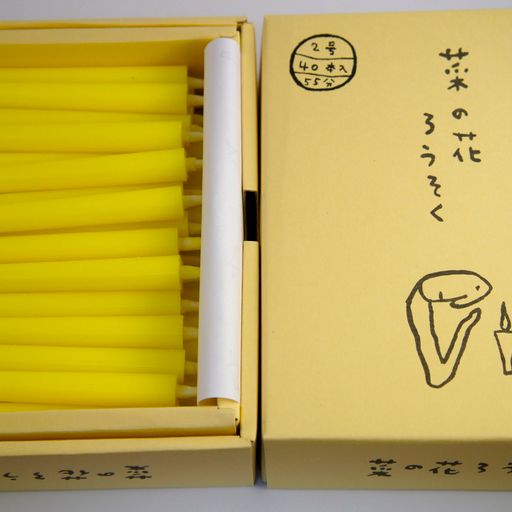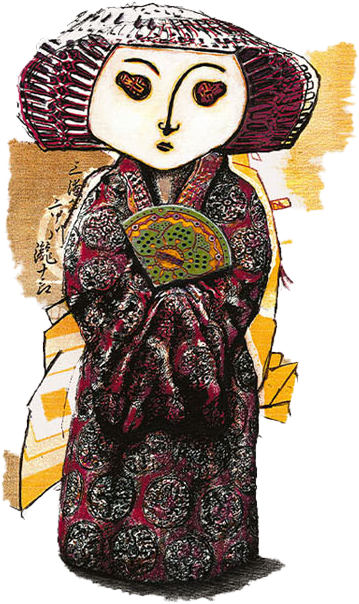Candle Nanohana
Candle Nanohana
24 pieces
Duration: 55 min
Good with KOMA Candle Stand M
Materials: Canola flower oil and paraffin
NANOHANA is the Japanese name for canola flower, and these candles are made from its oil. Canola blossom is a seasonal tradition of Noto island where the TAKAZAWA candles are manufactured.
Couldn't load pickup availability





Collapsible content
About the brand
TAKAZAWA CANDLE creates traditional Japanese candles, called "WA-ROUSOKU," made from natural waxes. They established their candle-making business back in 1892 in the city of Nanao, Ishikawa Pref., Japan.
About the background
It is said that WA-ROUSOKU (Japanese candles) were born in Japan through the introduction of Buddhism and based on an item dating back to the Nara period (710-794 AD) which was made of beeswax collected from beehives. In the Edo period (1603-1868 AD), the cultivation of haze (wax trees), a raw material used in WAROUSOKU, flourished in Kyushu and Shikoku, and these candles came into wide use by the masses. Blessed with a good natural harbor, Nanao thrived as a port of call for cargo ships that sailed the Japan Sea during this era. These ships brought the wax used in WA-ROUSOKU from Kyushu, and WASHI (Japanese paper) used in the wick from Iwami (Shimane Prefecture). After being manufactured in Nanao, WA-ROUSOKU were transported by the cargo ships once again, to areas across Japan. A candle making cooperative, ROUSOKU-ZA, was established in Nanao, and it continued into the middle of the Meiji period (1868-1912 AD). Today, TAKAZAWA Candle is continuing this tradition.
About the candles
The candles use a number of different kinds of waxes that are derived from plant-based raw materials: fruits of HAZE (sumac) tree, rice bran, canola flower oil, and fruits of URUSHI tree. The natural energy stored in these plants are utilized when these candles are burned, thus making them eco-friendly. When extinguished, the candles release less soot and less unpleasant odor thanks to the natural, plant-based waxes. The flame of the TAKAZAWA candles is bigger and brighter. This is due to the structure of the traditional wick which is thicker in diameter than the western counterpart's. The wick is made of the combination of WASHI-paper, rush weed, and silk fiber, all derived from the nature as well.
About the shape
WA-ROUSOKU have two traditional shapes. IKARI-GATA (anchor-shaped) widens at both the lower and upper parts and narrows in the center. The other shape, BOU-GATA (stick-shaped), is of cylindrical form. The term IKARI-GATA is derived from the anchor of a ship, "IKARI" in Japanese. There is both a scientific and aesthetic side to this unique shape. The upper part was designed to widen at the top to prevent wax from running down off of the candle after it had been lit. Additionally, this made the candle pleasant on the eye, and thus it came to have its current distinctive form. On top of these traditional shapes, TAKAZAWA has developed its own unique shapes as seen in the TOHAKU and NANAO series, inspired by the art and nature rooted in the city of NANAO, where the candles are made
Usage
WA-ROUSOKU is populair door de verspreiding van het boeddhisme, en vanwege deze historische achtergrond worden deze kaarsen vaak gebruikt als hulpmiddel bij gebeden en rituelen in gebedsplaatsen zoals tempels, boeddhistische altaren (BUTSUDAN) in huizen en begraafplaatsen. WA-ROUSOKU is ook een manier geworden om tijd voor onszelf te
creëren te midden van ons drukke, moderne leven. Kaarsen kunnen worden aangestoken om tijd te maken voor meditatie, yoga en ontspanning, waardoor rust wordt hersteld in lichaam en geest totdat de vlam vanzelf dooft. Elk item is een weergave van uniek vakmanschap
Precautions for use:
How to burn a candle safely:
1. Japanese candles burn
with a large, bright flame. Keep the candle at a safe distance from other items
and do not place flammable items above the candle.
2. Candles will melt if left in warm places such as a car in summer, etc. Store them in cool places out of direct sunlight.
Before Lighting:
1. Use a candlestick that is the correct size for the candle. Secure the candle up right making sure it doesn't wobble, and
light it in a place out of reach of wind and breezes.
2. A white powder may appear on the surface of WA-ROUSOKU. This is a trait unique to plant-based wax and occurs when the wax crystallizes. It is not a quality defect.
3. Please note you do not need to push down a candle until it reaches at the bottom of a holder. When a candle stops and does not go down any further, it is the right place.
4. Warm up wax left on the candlestick with warm water, melt, and rinse. Wipe the candlestick with a soft cloth and make sure to dry the candlestick completely before using it again.
While Burning:
1. While the candle is burning, cut the black burnt part of the wick down to adjust the size of the flame. A specialist wick trimmer is recommended for this. Melted wax may splatter if you extinguish the candle by blowing it out.
2. Do not place lit candles close together. Heat from one candle may cause the wax of a nearby candle to melt and run. Keep candles within your line of sight.
3. Do not leave a room without fully extinguishing the flame of any lit candles.
4. Please only light candles in appropriately maintained rooms.5. Do not place candles near flammable materials. For example, please avoid placing candles near furniture, beds, carpets, books, or other paper materials.
6. Keep lit candles out of reach of children or pets.





